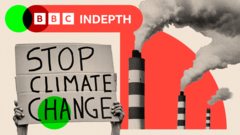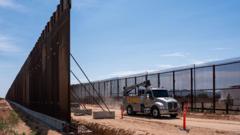As the COP29 climate conference unfolds, the United States' imminent exit under President-elect Donald Trump raises concerns about the future of international climate actions. However, China, traditionally a cautious participant, is emerging as a more proactive force, indicative of a possible power shift in the global climate negotiation landscape.
COP29: A Shifting Power Dynamic in Climate Negotiations

COP29: A Shifting Power Dynamic in Climate Negotiations
With the potential withdrawal of the US from COP talks, China appears ready to fill the leadership void in global climate discussions, shifting the dynamics significantly.
As global leaders gather for COP29, a pivotal moment arises in the realm of climate negotiations. A WhatsApp message from the chief negotiator of a major nation set the stage for discussions filled with tension, as frustrations grew about the progress—or lack thereof—among the many negotiating teams. Many delegates lamented this year’s conference as one of the most unproductive, grappling with an influx of increasingly convoluted negotiating texts as deadlines approached. The specter of a second term for US president-elect Donald Trump looms large, as he has consistently disparaged climate initiatives, labeling them a “scam” and advocating for an increase in US oil production that could further undermine international agreements.
Despite these troubles, a notable shift is being signaled by China. “It’s the only bright spot in all of this,” one negotiator expressed. This year, China appears determined to project a more cooperative stance—a departure from its previous dual role of sometimes aligning with developed nations while also obstructing certain discussions. This newfound readiness was evident when China publicly disclosed its climate funding for the first time: over $24 billion directed to developing nations since 2016, an amount that elicited surprise and appreciation from conference delegates.
Characterized as a developing country within UN climate frameworks, China’s resistance to change its status has historically exempted it from certain funding obligations. However, with developing countries facing a mounting need for investment in renewable energy transitions—estimated at $1 trillion yearly—China's financial commitments have gained prominence.
The language employed by Chinese negotiators also reflects a potential claim to leadership within COP talks. Unlike past years where their positions heavily referenced American actions, this year’s discourse from China increasingly mirrors that of developed nations, suggesting a serious commitment to the global climate dialogue.
Notably, China's rapid advancements in renewable technologies place it at the forefront of the global market; it produces a staggering proportion of solar panels, wind turbines, and electric vehicle batteries. This robust manufacturing capacity allows China to position itself as not only a participant but a key provider of technology essential for the clean energy transition—an attractive proposition for developing nations anticipating surging demands.
This is exemplified further through initiatives like the “Belt and Road Initiative,” illustrating a twofold strategy of establishing new trade routes while simultaneously exporting clean technologies—a financial initiative locked in with China's economic growth ambitions.
If China assumes a leading role in climate discussions, it could herald an era where the dynamics of COP processes change significantly. Historically driven by Western economies, particularly the US and EU, the alteration would present a conference landscape reshaped by Chinese methodologies, potentially leading to a more nuanced approach to negotiations.
Though some challenges remain, such as the influence of fossil fuel-rich nations like Saudi Arabia, there is a renewed sense of optimism among certain observers. With an eye on the evolving energy market, experts suggest that climate negotiations might now pivot towards investment-driven discussions, redefining the language of engagement in this vital arena.
As we witness this shift in leadership, the global focus on climate change will likely evolve into an economically motivated dialogue—an essential transformation in a time where the stakes have never been higher. The world will be carefully watching how these power dynamics play out in the ongoing quest for climate action.




















